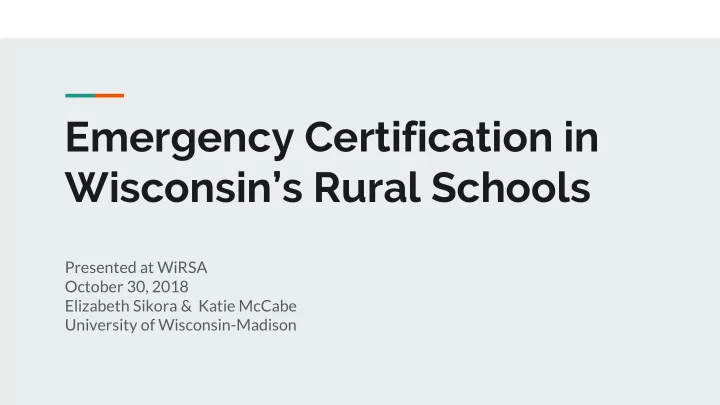

Emergency Certification in Wisconsin’s Rural Schools Presented at WiRSA October 30, 2018 Elizabeth Sikora & Katie McCabe University of Wisconsin-Madison
Emergency Certified Educators in Wisconsin
Impact of Emergency Certifications ★ Uncertified teachers produce significantly less strong student achievement gains than certified teachers (Darling-Hammond et al., 2006) ★ Students taught by uncertified teachers achieved about 20% less academic growth per year (Laczko-Kerr & Berliner, 2003)
Information about Emergency Certification ★ One-Year License with Stipulations ★ Three-Year License with Stipulations
Emergency Certified Educators in Rural Wisconsin
Rural Teacher Shortage ★ Rural schools face difficulty in recruiting and retaining highly-qualified teachers, especially in high needs areas (Schafft & Biddle, 2014) ★ Researchers have noted the smaller pool of applicants, fewer benefits, and lower salaries contributing to the shortage of specialized teachers in rural areas (Burton, Brown, Johnson, 2013; Zost, 2010)
2012
59% of rural or town districts had to hire emergency certified educators. 12 of these districts had 5 or more employees working under an emergency license.
2017
84% 59% of rural or town districts had to hire emergency certified educators. 74 12 of these districts had 5 or more employees working under an emergency license.
Emergency Certifications in 2016-2017
Wisconsin Department of Public Instruction, 2018 *Other includes administrators and pupil services.
Wisconsin Department of Public Instruction, 2018
Special Education Emergency Certification Areas
In 2016-2017, half of rural or Students with disabilities, who town districts ( n =164) had to are enrolled in these districts hire an emergency certified make up 18% of students with teacher to fill a vacant special IEPs across the state . education position. ★ In 2015-2016, 32 districts reported a third or more of their special education staff was working under emergency licensure. ★ 11 of these districts had ALL of their special education staff was not fully certified.
What does this look like in larger districts? Percent of CC teachers Number of Emergency Total CC Teachers School District (Locale) who are emergency Certified CC Teachers in District certified. Madison Metropolitan School 31 302 10.3% District (City) Milwaukee School District 167 528 31.6% (City) Verona Area School District 3 47 6.4% (Suburb) West Bend School District 53 6 5.7% (Suburb)
What does this look like in smaller districts? Percent of CC teachers Number of Emergency Total CC Teachers School District (Locale) who are emergency Certified CC Teachers in District certified. Ripon Area School District 2 6 33.3% (Town) Elkhorn Area School District 1 9 11.1% (Town) River Valley School District 1 8 12.5% (Rural) Monticello School District 1 2 50.0% (Rural)
The Impact on Wisconsin’s Rural Schools
Effects on Teacher Attrition ★ Almost half of emergency certified teachers transferred or left teaching (Patterson et al., 2003) ★ Reasons teachers leave the profession: Stress (Miller, Browell, & Smith, 1999) ○ Holding a probationary license ○ Having limited experience ○ Teaching in a specialized subject (Strunk & Robinson, 2006) ○
Are the teachers staying?
Are the teachers staying? 1 2 3 4 5 Rural 48.6% 46.8% 47.7% 42.9% 50% Town 48.6% 53.2% 50.8% 57.1% 50% Multiple 2.8% 0% 1.5% 0% 0% districts Total 26.7% 45.9% 24.1% 2.6% .7%
Emergency Certified to Fully Certified ★ Difficulty providing professional development opportunities to their teachers because of their physical distance from universities (Downing & Peckham-Hardin, 2007). ★ Traditional teacher preparation programs are also not typically well- situated to prepare teachers for the unique context and challenges of rural settings (Burton, Brown, Johnson, 2013).
Are they able to receive their full certification?
Comparing Full Certification in Rural and Town Districts
What areas are teachers getting their full certification?
How are teachers obtaining their certification?
How are teachers obtaining their certification?
So, what is a possible solution? How have emergency certifications impacted your districts? Have you seen programs that offer innovative solutions? What is the greatest need in this area you wish could be addressed?
Recommend
More recommend